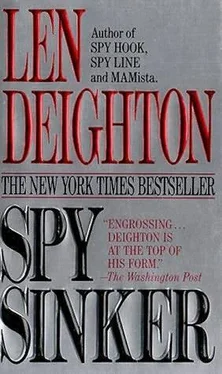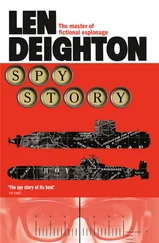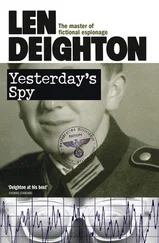Len Deighton - Spy Sinker
Здесь есть возможность читать онлайн «Len Deighton - Spy Sinker» — ознакомительный отрывок электронной книги совершенно бесплатно, а после прочтения отрывка купить полную версию. В некоторых случаях можно слушать аудио, скачать через торрент в формате fb2 и присутствует краткое содержание. Жанр: Триллер, на английском языке. Описание произведения, (предисловие) а так же отзывы посетителей доступны на портале библиотеки ЛибКат.
- Название:Spy Sinker
- Автор:
- Жанр:
- Год:неизвестен
- ISBN:нет данных
- Рейтинг книги:4 / 5. Голосов: 1
-
Избранное:Добавить в избранное
- Отзывы:
-
Ваша оценка:
- 80
- 1
- 2
- 3
- 4
- 5
Spy Sinker: краткое содержание, описание и аннотация
Предлагаем к чтению аннотацию, описание, краткое содержание или предисловие (зависит от того, что написал сам автор книги «Spy Sinker»). Если вы не нашли необходимую информацию о книге — напишите в комментариях, мы постараемся отыскать её.
Spy Sinker — читать онлайн ознакомительный отрывок
Ниже представлен текст книги, разбитый по страницам. Система сохранения места последней прочитанной страницы, позволяет с удобством читать онлайн бесплатно книгу «Spy Sinker», без необходимости каждый раз заново искать на чём Вы остановились. Поставьте закладку, и сможете в любой момент перейти на страницу, на которой закончили чтение.
Интервал:
Закладка:
'I'm not going to run away, if that's what you mean.'
'Have they told you what you are charged with?'
'I want a lawyer, a lawyer from the West.'
'That's a silly thing to ask, Werner.'
'Why is it?'
It was extraordinary that Werner, a German who came here regularly, still did not understand. Well, perhaps the best way to start was to make him realize what he was up against. This is the DDR, Werner, and it is 1984. We have a socialist system. The people…'
'The government.'
'The people,' she repeated, 'don't just control the politics and the economy, they control the courts, the lawyers and the judges. They control the newspapers, the youth leagues and the women's associations and chess clubs and anglers' societies. The privilege of writing books, collecting stamps, singing at the opera or working at a lathe – in fact the right to work anywhere – can be withdrawn at any time.'
'So don't ask for a lawyer from the West.'
'So don't ask for a lawyer from the West,' agreed Fiona. 'You'll have to sit in the back of the car. I can't remove the handcuffs. I can't even carry the key. It's a regulation.'
'Can I wash and shave?'
'At the other end. Do you have any personal possessions here?'
Werner shrugged and didn't answer.
'Let's go.'
'Why you?' asked Werner as they were walking across the cobbled courtyard to her Wartburg car.
' Machtpolitik ,' said Fiona. It meant negotiations under the threat of violence and was a uniquely German word.
None of the long-dead city officials who drew the outlandish shape of the old boundaries could have guessed that one day Berlin would be thus circumscribed and divided. Jutting southwards, Lichtenrade – where the S-Bahn line is chopped off to become a terminal, and where Mozart, Beethoven and Brahms are streets that end at the Wall – provides an obstacle around which Fiona had to drive to get back to her office in central Berlin.
The normal route back kept to the main road through Mahlow, but Fiona went on to back streets that might have saved her a few minutes in travelling time, except that when she got beyond Mahlow she turned off to a sleepy little neighbourhood beyond Ziethen. Here the pre-war housing of a 'Gartenstadt' had spilled over the Wall into the Democratic Republic. Bordered on three sides by the West, these wide tree-lined roads were empty, and the neighbourhood quiet.
'Werner,' said Fiona as she stopped the car under the trees of a small urban park and switched off the engine. She turned to look back at him. 'You are just a card in a poker game. You know that, I'm sure.'
'What happens to a card in a poker game?' asked Werner.
'At the end of the game you are shuffled and put away for another day.'
'Does it hurt?'
'Within a few days you'll be back in the West. I guarantee it.' A car came very slowly up the street. It passed them and, when it was about a hundred yards ahead, stopped. Werner said nothing and neither did Fiona. The car turned as if to do a U-turn but stopped halfway and then reversed. Finally it went past them again and turned to follow the sign that pointed to Selchow. 'It was a car from a driving school,' said Fiona.
'Why are you telling me this?' said Werner. The car had made him jumpy.
'I want you to take a message.'
'A written message?'
Good old Werner. So he wasn't so simple. 'No, Werner, a verbal message.'
'To Bernard?'
'No. In fact you'd have to promise that Bernard will know nothing of it.'
'What sort of game is this?'
'You come through regularly, Werner. You could be the perfect go-between.'
'Are you asking me to work for Moscow?'
'No I'm not.'
'I see.' Werner sat back, uncomfortable with his hands cuffed behind him. Having thought about it he smiled at her. 'But how can I be sure?' It was a worried smile.
'I can't do anything about the handcuffs, Werner. It is not permitted to have keys together with prisoners in transit.'
'How can I be sure of you?' he said again.
'I want you to go and talk with Sir Henry Clevemore. Would that satisfy your doubts?'
'I don't know him. I've never even seen him.'
'At his home, not in the office. I'll give you a private phone number. You'll leave a message on the answering machine.'
'I'm not sure.'
'Jesus Christ, Werner! Pull yourself together and decide!' she yelled. She closed her eyes. She had lost control of herself. The driving school car had done it.
Werner looked at her with amazement and suddenly understood the panic she had shown. 'Why me? Why now? What about your regular contact?'
'I have no regular contact. I have been finding my way around, using dumps. London would probably have sent someone in a month or so. But this is a perfect opportunity. I will enrol you as a Stasi agent. You'll report to me personally and each time you do I will give you the material to take back.'
'That would work,' said Werner, thinking about it. 'Would Sir Henry arrange material for me to bring?'
'All my reports must be committed to memory,' said Fiona. She had done it now: she had put herself at Werner's mercy. It would be all right. Later she would get Werner to tell her about her husband and her children but not now. One thing at a time.
Now he was beginning to believe. His face lit up and his eyes widened. He was to participate in something really tremendous. 'What a coup!' he said softly and with ardent admiration. In that moment he had become her devoted slave.
'Bernard must not know,' said Fiona.
'Why?'
'For all kinds of reasons: he'll worry and give the game away. He's not good at concealing his emotions. You must know that.'
He looked out of the window. Fiona had chosen her man well. Werner had always wanted to be a secret agent. He yearned for it as other people crave to be a film star or score goals for their country or host a chat show on TV. Werner knew about espionage. He read books about it, clipped newspapers and memorized its ups and downs with a dedication that bordered on the obsessional. There was no need for him to say yes; they both knew that he couldn't resist it. 'I still can't believe it,' he said.
The driving school car came into sight as it turned the corner. It slowed and stopped, the driver carefully indicating his intentions with unnecessary signals. 'I think we should go,' said Fiona.
'I'll do it,' said Werner quietly.
'I knew you would,' said Fiona as she started the engine.
She overtook the driving school car and turned as if heading back towards Mahlow. It was a silly precaution that meant nothing. 'You're a brave woman, Fiona,' said Werner suddenly.
'No one,' said Fiona. 'Sir Henry and no one else unless he authorizes it to you personally.'
'How long will it go on?' said Werner.
'One year; perhaps two,' said Fiona.
'I thought they might make me persona non grata,' said Werner. 'I was worried about my work.'
'You'll be all right now,' said Fiona. 'It will be a perfect set-up.'
'Bernard must not know,' said Werner. The idea of having a secret from his best friend appealed to Werner. One day he'd surprise Bernard. It would be worth waiting for.
'Let me tell you what to say when we get back to the office. You'll see a Russian KGB colonel named Moskvin. Don't let him bluff you or bully you. I'll make sure you are okay.'
'Moskvin.'
'He's not a long-term problem,' said Fiona.
'Why not?'
'He's not a long-term problem,' said Fiona. 'He is being got rid of. Just believe me. Now let me tell you how we're going to handle this business of your reporting to me.'
Two days later the exchange took place: Erich Stinnes went East to resume his work for the KGB while Werner Volkmann was freed and came West. The KGB inquiry into the treason of Pavel Moskvin sentenced him to death. The court decreed that verdict, sentence and execution must all remain secret: it was the KGB way of dealing with its own senior personnel. The local KGB commander – a general who had been a close friend of Moskvin's father – decided that 'killed in action in the West' would be merciful and expedient, and so arranged matters. But Moskvin did not accept his fate readily. He tried to escape. The resulting exchange of fire took place on the abandoned Nollendorfplatz S-Bahn station in West Berlin, now converted to a flea market. Moskvin died. Bret Rensselaer, demonstrating his loyalty to the Crown, led the chase after Moskvin and was shot and hurt so seriously that he never resumed his duties in London.
Читать дальшеИнтервал:
Закладка:
Похожие книги на «Spy Sinker»
Представляем Вашему вниманию похожие книги на «Spy Sinker» списком для выбора. Мы отобрали схожую по названию и смыслу литературу в надежде предоставить читателям больше вариантов отыскать новые, интересные, ещё непрочитанные произведения.
Обсуждение, отзывы о книге «Spy Sinker» и просто собственные мнения читателей. Оставьте ваши комментарии, напишите, что Вы думаете о произведении, его смысле или главных героях. Укажите что конкретно понравилось, а что нет, и почему Вы так считаете.












